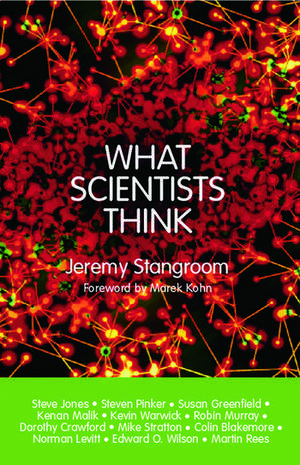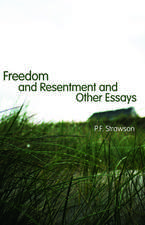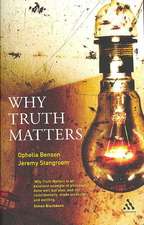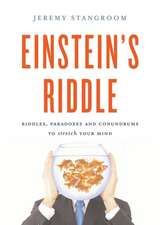What Scientists Think
Editat de Jeremy Stangroomen Limba Engleză Paperback – 13 mai 2005
These are just some of the compelling and provocative questions tackled here by twelve of the world's leading scientists and scientific thinkers. In engaging and lucid discussion, they clarify many of the most urgent scientific challenges and dilemmas facing science today.
Essential reading for anyone interested in popular science, What Scientists Think is edited and written by Jeremy Stangroom of the highly successful The Philosopher's Magazine and includes a foreword by Marek Kohn, author of A Reason for Everything: Natural Selection and the British Imagination.
Preț: 138.10 lei
Preț vechi: 188.97 lei
-27% Nou
Puncte Express: 207
Preț estimativ în valută:
26.43€ • 28.26$ • 22.03£
26.43€ • 28.26$ • 22.03£
Carte tipărită la comandă
Livrare economică 17 aprilie-01 mai
Preluare comenzi: 021 569.72.76
Specificații
ISBN-13: 9780415334273
ISBN-10: 0415334276
Pagini: 208
Dimensiuni: 129 x 198 x 15 mm
Greutate: 0.24 kg
Ediția:1
Editura: Taylor & Francis
Colecția Routledge
Locul publicării:Oxford, United Kingdom
ISBN-10: 0415334276
Pagini: 208
Dimensiuni: 129 x 198 x 15 mm
Greutate: 0.24 kg
Ediția:1
Editura: Taylor & Francis
Colecția Routledge
Locul publicării:Oxford, United Kingdom
Public țintă
GeneralCuprins
Preface. Introduction. The Interviews 1. Darwinism and Genes 2. Evolutionary Psychology and the Blank Slate 3. The Human Brain and Consciousness 4. Science and the Human Animal 5. Cybernetics and a Post-Human Future 6. Psychiatry and Schizophrenia 7. Microbiology, Viruses and Their Threats 8. On Cancer Research 9. Animal Experimentation, Ethics and Medical Research 10. Science Under Threat 11. Biodiversity 12. Science: Its Dangers and its Public Further Reading
Notă biografică
Jeremy Stangroom is co-editor of The Philosophers' Magazine.
Recenzii
'I don't often recommend books in the health column, but I have to make an exception this week. It's called What Scientists Think ... Why do I recommend it as a doctor? Because there are chapters on the brain and consciousness, on psychiatry and schizophrenia, on viruses and their threats, and on cancer research and animal experimentation, all of which are absolute 'must' reads for anyone who wishes to be properly informed on all of these subjects. If I were a schoolteacher I'd buy a copy for every teenager and certainly every student going to university - not just those studying science, but for all the others, too, who find science difficult or even alien ... it is straightforward and thought-provoking and if you have opinions on science be prepared to change them.' – Dr Tom Smith, Broadcasting Doctors' Association
'Highly personal yet wholly intellectual, the interviewees reflect current hotspots in research' – Victoria Neumark, TES
'What Scientists Think ... can begin, incrementally, to give non-scientists a glimpse of how scientists work, and their thoughts and worries ... Stangroom has produced a volume in which the issues are contemporary and the interviewees speak clearly and non-technically. At just 194 pages, it is a simple and pleasingly effective manual for understanding scientists and what they think.' – Mark Pagel, New Humanist
'The overall result is a very light and easy read full of engaging discussion and food for thought' - Chemistry World
'I don't often recommend books in the health column, but I have to make an exception this week. It's called What Scientists Think and is a series of interviews with twelve of the world's top scientists. Luckily, you don't need a degree to understand them - the interviews are easy to read, although they do require some thought on your part. Why do I recommend it as a doctor? Because there are chapters on the brain and consciousness, on psychiatry and schizophrenia, on viruses and their threats, and on cancer research and animal experimentation, all of which are absolute 'must' reads for anyone who wishes to be properly informed on all of these subjects. If I were a schoolteacher I'd buy a copy for every teenager and certainly every student going to university - not just those studying science, but for all the others, too, who find science difficult or even alien ... it is straightforward and thought-provoking and if you have opinions on science be prepared to change them.' - Dr Tom Smith, Broadcasting Doctors' Association
'Stem cell research: ever wondered what scientists actually think of it? Have you ever questioned what goes on in the minds of geneticists, biologists, astronomers? A new book, edited by Jeremy Stangroom, shows what matters to 12 of the world's most important scientists: not only their thoughts on their current projects but their hopes and fears for the future. What Scientists Think addresses some controversial subjects, such as GM crops and that political hot potato, hospital superbugs. This topic is discussed by Professor Dorothy Crawford, a world authority on viruses, who says that "MSRA is more worrying than something like SARS."' - Rebecca Pearson, Independent on Sunday: Review
' ... there is loads of observation and complicated explanation stored under the heading "science", much of which you need lots of maths to digest. But these 12 helpful brains can give you the gist - not of current theories but of the relationship eminent practitioners have with their areas of expertise.' - Victoria Neumark, Times Education Supplement
'Highly personal yet wholly intellectual, the interviewees reflect current hotspots in research ...' - Victoria Neumark, TES
'What Scientists Think ... can begin, incrementally, to give non-scientists a glimpse of how scientists work, and their thoughts and worries ... Stangroom has produced a volume in which the issues are contemporary and the interviewees speak clearly and non-technically. At just 194 pages, it is a simple and pleasingly effective manual for understanding scientists and what they think.' - Mark Pagel, New Humanist
'a powerful insight into scientific mind and method' Globe and Mail
'Many books contain insights by scientists - but few offer the focus of What Scientists Think...From the impact of a cure for cancer to the threat from bioterrorism, What Scientists Think provides much food for thought' The Midwest Book Review
'Highly personal yet wholly intellectual, the interviewees reflect current hotspots in research' – Victoria Neumark, TES
'What Scientists Think ... can begin, incrementally, to give non-scientists a glimpse of how scientists work, and their thoughts and worries ... Stangroom has produced a volume in which the issues are contemporary and the interviewees speak clearly and non-technically. At just 194 pages, it is a simple and pleasingly effective manual for understanding scientists and what they think.' – Mark Pagel, New Humanist
'The overall result is a very light and easy read full of engaging discussion and food for thought' - Chemistry World
'I don't often recommend books in the health column, but I have to make an exception this week. It's called What Scientists Think and is a series of interviews with twelve of the world's top scientists. Luckily, you don't need a degree to understand them - the interviews are easy to read, although they do require some thought on your part. Why do I recommend it as a doctor? Because there are chapters on the brain and consciousness, on psychiatry and schizophrenia, on viruses and their threats, and on cancer research and animal experimentation, all of which are absolute 'must' reads for anyone who wishes to be properly informed on all of these subjects. If I were a schoolteacher I'd buy a copy for every teenager and certainly every student going to university - not just those studying science, but for all the others, too, who find science difficult or even alien ... it is straightforward and thought-provoking and if you have opinions on science be prepared to change them.' - Dr Tom Smith, Broadcasting Doctors' Association
'Stem cell research: ever wondered what scientists actually think of it? Have you ever questioned what goes on in the minds of geneticists, biologists, astronomers? A new book, edited by Jeremy Stangroom, shows what matters to 12 of the world's most important scientists: not only their thoughts on their current projects but their hopes and fears for the future. What Scientists Think addresses some controversial subjects, such as GM crops and that political hot potato, hospital superbugs. This topic is discussed by Professor Dorothy Crawford, a world authority on viruses, who says that "MSRA is more worrying than something like SARS."' - Rebecca Pearson, Independent on Sunday: Review
' ... there is loads of observation and complicated explanation stored under the heading "science", much of which you need lots of maths to digest. But these 12 helpful brains can give you the gist - not of current theories but of the relationship eminent practitioners have with their areas of expertise.' - Victoria Neumark, Times Education Supplement
'Highly personal yet wholly intellectual, the interviewees reflect current hotspots in research ...' - Victoria Neumark, TES
'What Scientists Think ... can begin, incrementally, to give non-scientists a glimpse of how scientists work, and their thoughts and worries ... Stangroom has produced a volume in which the issues are contemporary and the interviewees speak clearly and non-technically. At just 194 pages, it is a simple and pleasingly effective manual for understanding scientists and what they think.' - Mark Pagel, New Humanist
'a powerful insight into scientific mind and method' Globe and Mail
'Many books contain insights by scientists - but few offer the focus of What Scientists Think...From the impact of a cure for cancer to the threat from bioterrorism, What Scientists Think provides much food for thought' The Midwest Book Review
Descriere
In engaging and lucid discussion, twelve of the world's leading scientists and scientific thinkers clarify many of the complex scientific challenges and dilemmas facing science today.












